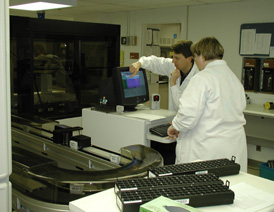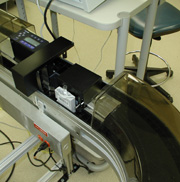 Resembling a racetrack, the conveyor system transports specimens in glass tubes to testing stations around the NHS University Hospital lab. The automated lab, which goes live Wednesday (April 30), will reduce medical errors, expedite patient test results and save money.
Resembling a racetrack, the conveyor system transports specimens in glass tubes to testing stations around the NHS University Hospital lab. The automated lab, which goes live Wednesday (April 30), will reduce medical errors, expedite patient test results and save money.
The pathology department recently renovated part of the third-floor lab in University Hospital to house the new, LAB-InterLink system. Launching the system Wednesday will cap nearly three years of planning spearheaded by Steve Deberg, director, NHS pathology; James Wisecarver, M.D., Ph.D., UNMC director of clinical laboratories; and Rodney Markin, M.D., Ph.D., vice chairman, UNMC pathology and microbiology.
|
LAB-InterLink was founded in 1993 by Rodney S. Markin, M.D., Ph.D, as a technology transfer company through UNMC’s technology transfer arm – UNeMed Corporation. Dr. Markin is vice chairman of UNMC pathology and microbiology department and chairman of LAB-InterLink. “So much progress has been made in the past year,” said Mary Newcomb, president and chief operating officer of LAB-InterLink. “We now have two facilities in Omaha as well as our offices in Canada. We have more than 130 employees, and more than 30 client sites. Our recent growth has been amazing, so we look forward to seeing what the next year holds for us.” The Omaha-based company pioneered the development of commercial clinical chemistry automation technology solutions in North America. It remains the only North American company focusing 100 percent of corporate resources on laboratory automation technology. The company has automation systems in hospitals and medical centers in 30 sites worldwide, including the United States, Canada, Europe and the Middle East. Last fall, the company demonstrated its technology to Homeland Security Advisor Tom Ridge, after assembling the system in the Durham Outpatient Center West Atrium in less than 48 hours. Although, there are many automated systems in use around the country, the LAB-InterLink system is different than most, said Dr. Markin, who serves as vice chairman of UNMC pathology and microbiology, chairman and CEO of LAB-InterLink and president of University Medical Associates. “Our system is software driven, while most other automated systems are hardware driven,” he said. |
“No one in Nebraska or our surrounding states has a system like this,” Dr. Markin said. “This is the most complex conversion that the lab has ever attempted.”
The LAB-InterLink automated system consists of several testing stages along 112 feet of dual conveyor system. The system’s robotic arm takes specimens from the lab racks and places them in one of two centrifuges. After testing is complete, the specimens are cataloged and stored by a storage and retrieval module. Deberg estimates that the lab spends up to $87,000 a year in specimen retrieval, which will now become a savings to the organization.
In short, the system expedites specimen testing for faster results. The rapid turnaround will eventually reduce the length of stay for many patients. Time is saved because the automated system is able to prioritize many of the tests, Deberg said. “If there is a backup at one of the testing modules, the computer will read that and send the specimen down the line to another test that isn’t backed up,” he said. “It will return the specimen to the original location when the logjam has been alleviated. That can save minutes on numerous tests.”
Up to 60 percent of laboratory tests at NHS will be processed by the automated system, Deberg said.
A great deal of the time savings and error reduction will occur in the pre-analytic process. This is the time before and during the actual testing of the specimen. The pre-analytic phase is when most errors can occur. Deberg estimates that each specimen is touched between 35 to 40 times in this phase. The automated system will reduce the number of human touches to five to seven times, which in turn will reduce error opportunities.
Personnel training has been ongoing for several weeks. Approximately 35 technicians will go through the time intensive, one-on-one training.
 Other members of the planning team included: Beth Avery, manager, Rapid Response Laboratories; Chris Thomas, manager, Support Services; Jana Clark, laboratory information systems specialist; and Susan Griffith, laboratory information systems specialist.
Other members of the planning team included: Beth Avery, manager, Rapid Response Laboratories; Chris Thomas, manager, Support Services; Jana Clark, laboratory information systems specialist; and Susan Griffith, laboratory information systems specialist.